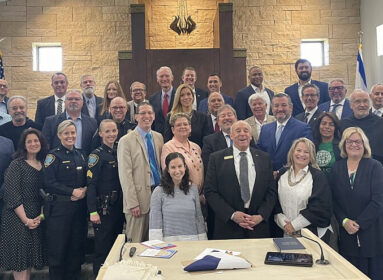“‘Soft core’ Holocaust denial is not denying the facts; it’s inverting them in a way that the victims become the perpetrators.”
By Cindy Mindell
Deborah E. Lipstadt, Dorot Professor of Modern Jewish and Holocaust Studies at Emory University, is an internationally respected historian of the Holocaust. She has been at the forefront of efforts to confront and respond to revisionist accounts of the Nazi genocides. She will present “Holocaust Denial: A New Form of Anti-Semitism” at UConn West Hartford on Monday, Nov. 11, sponsored by the UConn Center for Judaic Studies and Contemporary Jewish Life and the Doris and Simon Konover Chair of Judaic Studies.
Lipstadt first came to wider public attention when she and Penguin Books, the publisher of her book, Denying the Holocaust: The Growing Assault on Truth and Memory (1993), were sued for libel by the British historian David Irving. In the book, Lipstadt called Irving “one of the most dangerous spokespersons for Holocaust denial.” In a celebrated court case, Lipstadt’s attorneys brought forth irrefutable evidence of the atrocities of the Shoah, soundly defeating Irving’s accusations that Lipstadt’s depiction of him as a Holocaust-denier was false and libelous. Lipstadt went on to write a memoir of the trial, “History on Trial: My Day in Court with David Irving” (Ecco, 2005), optioned for a film by Sony Pictures.
After the trial, Lipstadt and Emory University launched the website, “Holocaust Denial on Trial” (hdot.org), an educational resource that helps refute denial with historical evidence. The site is translated into Arabic, Farsi, Russian, and Turkish, with plans to translate it into Spanish.
Lipstadt is also author of Beyond Belief: The American Press and the Coming of the Holocaust, 1933-1945 (Free Press, 1985) and the award-winning The Eichmann Trial (Schocken, 2011). A consultant to the United States Holocaust Memorial Museum, Lipstadt was appointed in 1994 by Pres. Bill Clinton to the United States Holocaust Memorial Council, on which she served two terms.
Lipstadt first used the term “soft core denial” at the 2007 Zionist Federation’s annual fundraising dinner in London. Referring to groups such as the Muslim Council of Britain, she stated, “When groups of people refuse to commemorate Holocaust Memorial Day unless equal time is given to anti-Muslim prejudice, this is soft-core denial.” At the event, she also applied the term to former President Jimmy Carter, who had omitted the period 1939 to 1947 from a chronology in his book, Palestine: Peace Not Apartheid.
Lipstadt spoke with the Ledger about the shape of Holocaust denial since the David Irving trial.
Q: While you describe Holocaust denial as a “new form” of antisemitism, it seems as if the delegitimization of Israel is actually the latest form. How are each of these phenomena being manifest today?
A: Clearly, all the people who criticize Israel are not ipso facto engaging in antisemitism. That has to be remembered. When we hear criticism of Israel and go to that place of “Ach, antisemitism,” I think we diminish the real threat of antisemitism; we diminish both their criticism and the real threat of antisemitism. If you want to see criticism of Israel, look at the front page of Israeli newspapers. For some people, attacking Israel across the board – questioning its right to exist, making it the sole focus of human-rights violations – often borders on antisemitism, and I’m not sure what side of the border it’s on.
Since the early years of the 2000s, what I call “hard core Holocaust denial” – there were no gas chambers, Jews weren’t killed, etc. – has weakened considerably, in part as a result of my trial, which put a significant dent in Holocaust denial. Ahmadinejad is, of course, the most public and vocal Holocaust denier in recent history. But each time he engaged in that rhetoric, he looked idiotic. If you wanted to show how off-the-wall and beyond redemption this man was, you just have to point to his Holocaust denial, along with his blatant threats toward Israel. He showed how discredited hard core Holocaust denial is. That type of denial is still in existence in the Middle East, even though Ahmadinejad is no longer president of Iran; it hasn’t gone away.
What isn’t diminished is this “soft core” kind of denial – the false comparisons, like comparing communism and Nazism, referring to Israel as a “Nazi state” and comparing the tactics and behavior of the Israeli Defense Forces to the Gestapo. In those cases, criticism of Israel morphs into a kind of antisemitism.
But soft core denial is harder to pin down, and it’s hard to tell how widespread it is. There’s so much disseminated on the Internet, but we don’t see much in the U.S. or Western Europe. To some degree, we see it in former communist countries, for example, when people make false comparisons that dilute what the Holocaust was. For example, they’ll compare communism to Nazism, so that a Holocaust survivor can go from being a hero to being a collaborator in the same sentence. Soft core denial is more slippery. Someone might say, “Why do we have to hear so much about the Holocaust?” or talk about the “genocide of Palestinians.” Soft core denial is not denying the facts; it’s inverting them in a way that the victims become the perpetrators: “Why did the Germans hate the Jews? Because the Jews were rich and conniving,” as if to say that Jews deserved what the Nazis did to them and justifying it.
Q: How can the average person refute Holocaust denial?
A: Without getting into the details of how many gas chambers there were and whether documents are factual, one of the things to say is, if deniers have to be right, who has to be wrong? Paula Hyman, of blessed memory, professor of modern Jewish history at Yale, used that in her classes, and it captures the basic question underlying Holocaust denial.
If deniers have to be right, who has to be wrong? First off, the survivors do, and to the denier one can ask, where did all those stories come from? Were all survivors grouped together and told what to say? Deniers say, this survivor says one thing; another survivor says something different. But that’s an indication that the accounts are more trustworthy, not less trustworthy. Imagine if everybody coming out of 9/11, that terrible day, with the same words, story, and description of events, you’d say that those people were coached.
Not only would the survivors all have to be wrong, but the bystanders who saw the Holocaust happening would have to be wrong, those who lived in the villages around Theresienstadt and other camps, who saw the trains coming in full and leaving empty.
The perpetrators would also have to be wrong, those who said, we did this – not just at the government level, not just in a courtroom, but those who gave interviews to Claude Lanzmann for his documentary, Shoah, and in lots of different settings. The physicians interviewed by Robert Jay Lifton in his masterwork The Nazi Doctors – they would all have to be lying.
So if the Holocaust didn’t happen, where did these millions of people disappear to? Deniers would say that they’re behind the Iron Curtain. Last time I checked, the Iron Curtain came down in 1991 and these people never reappeared. Deniers will say: the Germans were so efficient that if they wanted to kill all the Jews, they would have. In my classes, I put the question to the students: If the Germans were so efficient and got everything done that they wanted, what can you point to that shows that they weren’t efficient and didn’t get done what they wanted? A student will say, “They didn’t win the war.” So on some level, you can answer a Holocaust denier quite directly.
“Holocaust Denial: A New Form of Anti-Semitism” with Deborah Lipstadt: Monday, Nov. 11, 7:30 p.m., UConn Greater Hartford Campus, Library Building Auditorium, 85 Lawler Road, West Hartford. Admission is free, but seating is limited. Ticket information: Center for Judaic Studies and Contemporary Jewish Life at UConn, (860) 486-2271/judaicstudies@uconn.edu
For more information on refuting Holocaust deniers: hdot.org
This lecture is also supported by the Archdiocese of Hartford, the Jewish Community Foundation of Greater Hartford, the Greater Hartford Rabbinic Association, the Development Corporation for Israel, the Jewish Historical Society of Greater Hartford, the University of Hartford Greenberg Center for Judaic Studies, and the Jewish Federation of Greater Hartford.
Comments? email cindym@jewishledger.com.








 Southern New England Jewish Ledger
Southern New England Jewish Ledger










